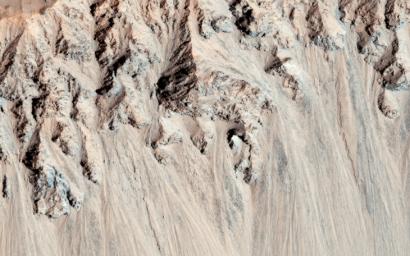
|
Crater with Debris Aprons in Tyrrhena Terra
- Click the image above for a larger view
- Full-Res JPEG (2880 x 1800) (821.8 kB)
- Full-Res TIFF (2880 x 1800) (15.6 MB)
Caption:
This well-preserved impact crater in Tyrrhena Terra, northeast of Hellas Planitia, is approximately 6 kilometers in diameter. The interior rims of this crater are lined with debris aprons consisting of material eroded from the alcoves at the top of the crater walls.
The resolution of the HiRISE camera is able to see accumulations of meter-scale rocks at the base of the debris aprons. The interior crater floor has exposures of bright-toned material and small aeolian ripples.
Background Info:
HiRISE is one of six instruments on NASA's Mars Reconnaissance Orbiter. The University of Arizona, Tucson, operates the orbiter's HiRISE camera, which was built by Ball Aerospace & Technologies Corp., Boulder, Colo. NASA's Jet Propulsion Laboratory, a division of the California Institute of Technology in Pasadena, manages the Mars Reconnaissance Orbiter Project for the NASA Science Mission Directorate, Washington.
Cataloging Keywords:
| Name | Value | Additional Values |
|---|---|---|
| Target | Mars | |
| System | ||
| Target Type | Planet | |
| Mission | Mars Reconnaissance Orbiter (MRO) | |
| Instrument Host | Mars Reconnaissance Orbiter | |
| Host Type | Orbiter | |
| Instrument | High Resolution Imaging Science Experiment (HiRISE) | |
| Detector | ||
| Extra Keywords | Color, Crater, Impact | |
| Acquisition Date | ||
| Release Date | 2013-05-29 | |
| Date in Caption | ||
| Image Credit | NASA/JPL-Caltech/Univ. of Arizona | |
| Source | photojournal.jpl.nasa.gov/catalog/PIA17735 | |
| Identifier | PIA17735 | |
